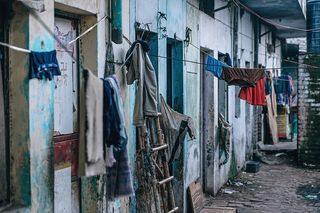Creativity
'Parasite' was a Master Class in Dark Creativity
The Kim family used clever deceit to overcome their plight.
Posted May 15, 2020
Warning: Spoilers ahead!
The 2020 Oscar-winning movie Parasite is a dark comedy commenting on poverty, opportunity, and class dynamics specific to South Korea. Yet the themes of the movie resonated with audiences around the world. The movie follows an economically disadvantaged family as they resort to malevolent means to gain employment, after struggling to make a decent living.

This family of middle-aged parents and their adult children finds its way into the home of a rich family when the boy (Ki-woo Kim) is presented with an opportunity to tutor the teenage daughter of the homeowners. The catch, however, is that the boy has to lie about his qualifications through a forged certificate, highlighting that even when he had the essential skill set, he was not able to land the job without a “legitimate” qualification. Ki-woo gets the tutoring gig, and with it begins the family’s meticulous planning and deception to earn jobs for everyone in the same house.
The Kim family uses extremely deceitful, but very creative means to seek employment. They deploy original ideas tailored to leverage the dynamics of the elite family they want to infiltrate. For instance, the daughter (Ki-jung), who gets hired as an art therapist for their son through her brother’s recommendation, goes on to frame the family’s driver, leading to his removal. The new driver, of course, is the girl’s own father (Ki-taek). The family then collectively orchestrates the removal of the househelp by falsely convincing the owner that she is sick. Thus, the mother (Chung-sook) fills the position of the housekeeper.

There are several disadvantaged families, just like the protagonists’; however, the Kim family is able to create an opportunity for themselves because their collective personas are able to construct a plan novel enough to cement their position in the house. We know that dispositional creativity is linked to dishonesty. However, in order to successfully execute a dark creative idea, it is important to engage in both moral and cognitive flexibility. This is demonstrated in the way the Kim family navigates the problems they face in their employers’ house, and puts measures in place to avoid any suspicion. For instance, Ki-jung, who is teaching their son art, makes his mother believe that he has tendencies toward schizophrenia, thereby inducing paranoia and increasing the dependability of her role as an art therapist. Some research also suggests that financial constraints can spur creative thinking, and thereby cognitive flexibility. The Kim family’s poverty and hardship were depicted as being a powerful motivator to move beyond that state, and into a more financially rewarding one. The creative problem-solving they depict here is, however, not just a result of their hardship, but an interplay of their personalities with the situations they encounter. This is what sets them apart from others in a similar situation.
As far as the scientific concept of dark creativity (getting good ideas to do bad things) is concerned, Parasite checks most of the boxes. However, the movie also highlights an aspect that may be imperative in understanding dark creativity. Namely, the more successful the end result of this kind of creative problem-solving is the more audacious one might get about their capacity for cutting corners, leading to dire consequences. Simply, they can get overconfident about their creative deceit. This is evident when the Kim family stops anticipating being ousted, and throws themselves a party at their employers’ house the minute they leave for a short trip. In an unanticipated twist, the previous housekeeper returns and it is revealed that she was hiding her husband in the basement of the house all this time, to save him from loan sharks. She soon uncovers the Kims’ dishonesty, and they find out about her entirely different, but nevertheless creative, handling of her own problem (knowing that the owners were unaware of the secret basement to the house).

Research indicates that financially disadvantaged people are likely to focus more on specific problems, and neglect others. This might explain why the family did not focus on any extrinsic reasons for why their plans may be hampered, at least initially. However, once their position was challenged by the previous housekeeper, they were quickly able to turn the tables. The family escaped a touch-and-go situation again by thinking on their feet and exhibiting creative problem solving through a new solution, highlighting their capabilities to adapt. Despite this, the movie does not reward them in the end.
There isn’t a doubt that the movie is a cinematic masterpiece and can be analyzed through myriad sociopolitical lenses. However, this analysis focuses on creative relativism in a way. The levels of creative dishonesty applied also fluctuated across the four Kim family members, with the daughter’s role as an art therapist being the most deceptive. Everyone else was quite literally making an honest living, despite the way in which they procured the job. The premise of Parasite goes to show how we must separate the means from the ends of dark creative acts.
This post was written with Sampada Karandikar, a research psychologist at the Department of Psychology, Monk Prayogshala. She tweets @sampada_sk.


